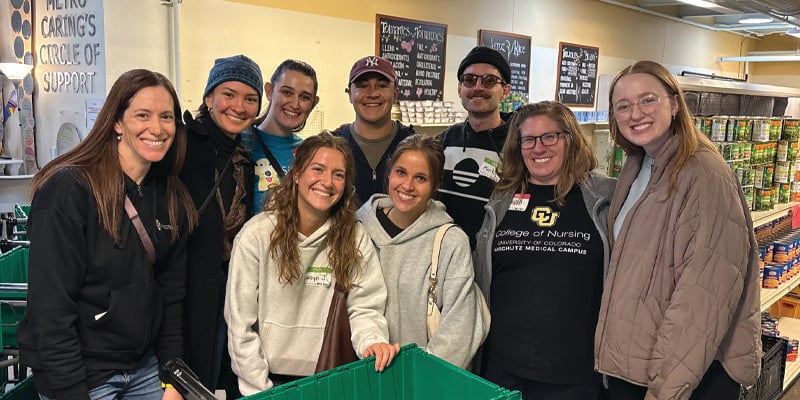For burn survivors, Wayne Winkler and Shannon Bennett, participating in Dr. Teresa Connolly’s Nursing Care of the Adult Patient with Complex Care Needs class is a way for nursing students to become better nurses while giving back to those who helped them during recovery. For the students, understanding the physical and mental pain, anguish, and guilt associated with their condition is key to treating patients with compassion and empathy – essential elements in helping patients heal.
Assistant Professor Connolly said, “The students get to see patients in a whole different light. They are people who deserve compassionate care regardless of how they got there. It’s our job to deliver it without bias and judgment.”
According to CU Nursing student Sabs Sheppard, “Sometimes we forget that we will be dealing with people and not just a condition. And our reactions – verbal and non-verbal – have an impact. This is so powerful.”
While disclosing harrowing tales of the accidents (self-induced or not) that caused them to spend months in the hospital, sometimes in medication-induced comas, Winkler and Bennett reveal more than just their psychological and physical scars.
For Winkler, being burned over 27% of his body caused him to assess his life. “I was making hash oil. It was stupid. I feel guilt, anger, and pain every day. But strangers helped me come to terms with it.” Now he gives back.
When his house exploded, Winkler tried to open his front door, but the skin on his hands stuck to the knob. After being transported to a local hospital, Winkler felt “judged.” He was soon transferred to University of Colorado Health’s burn unit where he had an entirely different experience. “It was a judgment-free zone. I was already dealing with the guilt of what I had done. I didn’t have to explain what happened and see that look in their eyes. They just took care of me and showed they cared.” In addition to the tremendous care he received, he didn’t have to worry about the cost. “The second day I was there, Ricardo Ramirez told me that my bill had been paid for by generous donors. That was such a relief as I didn’t have insurance,” said Winkler.
Part of Winkler’s care included pain medications, talking to other burn survivors, and counseling. “What truly made the difference for me was the other burn patients who really understood what I was experiencing. They spent time with me…listening to me. I’ve never known the main reason why I received so much love. But I want the next person to receive the same.” Winkler shares his story with nursing students, as well as a scrapbook of his care that he calls his “burn book,” which recounts his journey in photos and words.
Shannon Bennett’s story is different but similar to Winkler’s. She was burned over 87% of her body in an oil field fire in Wyoming and airlifted to UC Health, where she spent 7 months in a coma, and 3½ months in the rehab unit at the hospital. When Bennett woke from her coma, the only thing she could do was press her call button. “My muscles atrophied because of months of no movement. Everything hurt. I had to stretch my skin and muscles – and that was extremely painful.”
One day a fellow survivor came into her room and visited her. “He helped me see life after the burns and the accident,” Bennett recalled. Her lifeline became a burn support group – Survivors Offering Assistance in Recovery (SOAR). Today, she tells her story to fellow burn patients and nursing students and even to large audiences at fund-raising galas. Bennett, who has an ingrained fear of public speaking, uses these speaking engagements to empower herself.
“My thought was I was in the hospital nearly a year and they saved my life. I wouldn’t be here if not for the hospital. So, I pay it forward. If I can encourage someone else in their journey and help the nurses by being a guinea pig and telling my story – if it helps, why not?”
Advice Bennett has for health care providers and nurses in training is not to jump to conclusions about people, and why they have a specific condition or are in the hospital. “You don’t know their exact history or story. Try to see past your biases.”



